PARLIAMENT
No-confidence motions against Ramaphosa and Cabinet lay bare fractious tensions in House
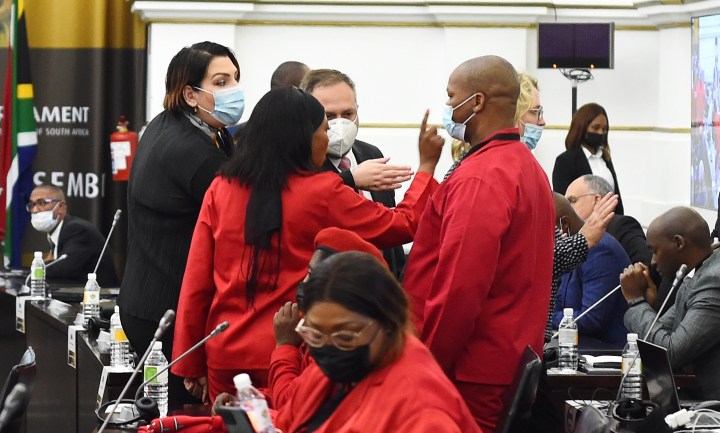
Parliament’s double-header of no-confidence motions turned into a mishmash of rules and procedure squabbling that led to the first fixture being adjourned when the proposer refused to play ball. The second part unfolded into a spectacle of insults across the — clearly inaptly named — Good Hope Chamber.
The spectacle may have been front and centre — ANC Chief Whip Pemmy Majodina didn’t make the vote as she was locked out after failing to be in the chamber before the bells for the vote stopped. But it’s the fraught interchanges on the motion of no confidence in President Cyril Ramaphosa that showcased fractured parliamentary politics.
That Wednesday’s unprecedented double-header would go sideways became apparent at the start.
The African Transformation Movement (ATM) leader, Vuyolwethu Zungula, declined to move his motion of no confidence in President Cyril Ramaphosa, saying his party was still before the court in an attempt to get a secret ballot.
“No member of Parliament may reflect on any case [before court]. There is ongoing litigation… There is no way in which we can still proceed with this vote.”
His point of order was backed up by EFF Chief Whip Floyd Shivambu, who said: “We know once a secret ballot comes, we will split the ANC vote in half…”
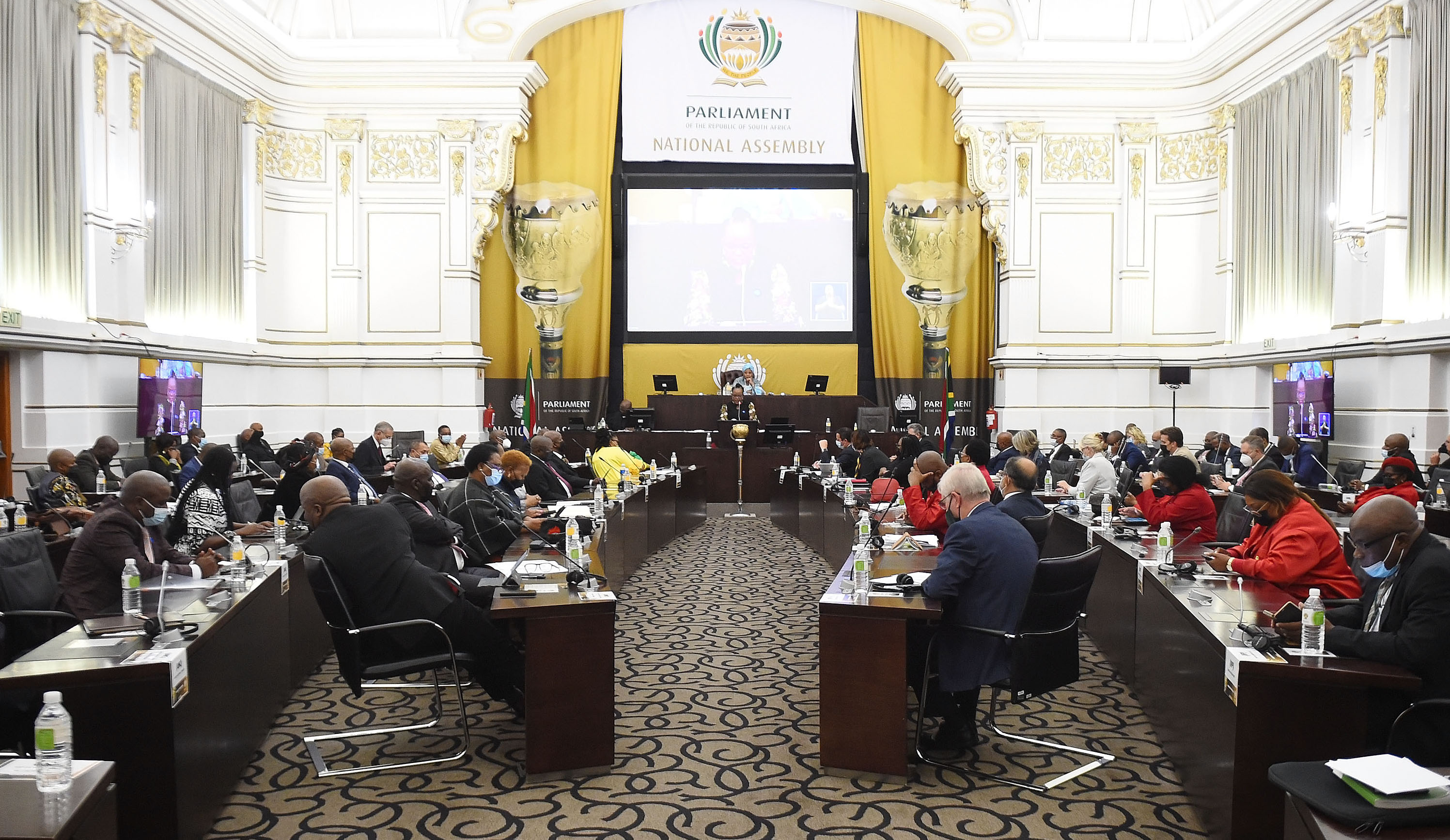
Members of Parliament at the National Assembly on 30 March 2022 before debating motions of no confidence tabled by the DA and the ATM. ATM leader Vuyolwethu Zungula had tabled a motion of no confidence in President Cyril Ramaphosa and DA leader John Steenhuisen had tabled a motion of no confidence in the Cabinet. (Photo: Xabiso Mkhabela)
But National Assembly Speaker Nosiviwe Mapisa-Nqakula would have none of it, saying she’d been advised this matter was not sub judice as the Western Cape High Court had declined to hear the ATM matter on Monday.
“In view [of the fact that] the member [Zungula] has declined to move the motion, there is, in fact, nothing for the House to debate and we will proceed to…”
It seemed Mapisa-Nqakula read off a prepared script somewhere in front of her just to the right, but Zungula interjected.
“I don’t want this House to say I declined to move,” he argued. “We are not proceeding. We are not withdrawing, up until this matter is finalised in the courts.”
And that’s how rules, procedure, litigation and politics collided.
Without being moved, a motion cannot proceed. And unless it is withdrawn under Rule 128, the motion stays on the order paper and under Rule 90 no other political party can bring a similar no-confidence motion.
Zungula declined to withdraw after Mapisa-Nqakula had dismissed his request to postpone the no-confidence motion, again, for the courts to rule on a secret ballot. In correspondence seen by Daily Maverick, the Speaker said she did “not have the power”, and kicked the matter back to the programming committee.
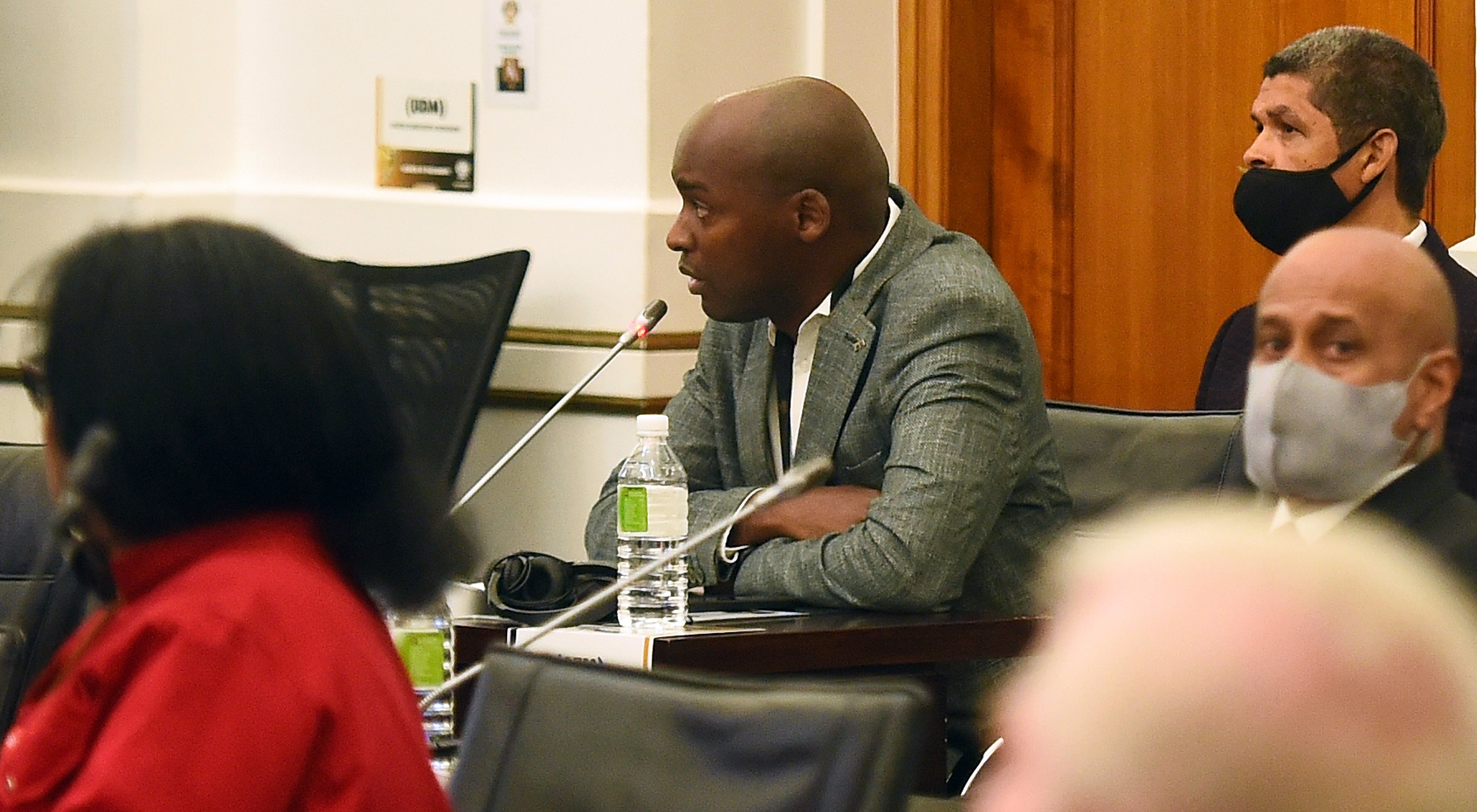
ATM leader Vuyolwethu Zungula tabled a motion of no confidence in President Cyril Ramaphosa at the National Assembly, but that was not debated and voted on. (Photo: Xabiso Mkhabela)
Key here are two points signalling institutional fracture — the role of the programming committee and the sub judice rule.
Mapisa-Nqakula told the previous programming committee she’d been advised it should only be a 30-minute meeting and that the Chief Whips Forum should come up with recommendations to the committee. This had the opposition repeatedly pointing out that it was the programming committee that was Parliament’s decision-making structure, not the political consultative Chief Whips Forum.
That Wednesday’s no-confidence motion in the President could fall foul was raised by the United Democratic Movement (UDM) Chief Whip, Nqabayomzi Kwankwa, at the programming committee of 23 March and again on Wednesday.
“We warned you about it last week. We asked for this to be scheduled after recess, but it seemed you wanted to deal with it in haste… At the [programming committee] the Deputy Speaker referred this to you for your decision. When you are expected to make that decision, it’s almost [that] we are playing footsie footsie.”
Deputy Chief Whip Doris Dlakude attempted to shield the Speaker and eventually after a rough and ready 40 minutes in the house, Mapisa-Nqakula concluded: “I now rule we will not proceed on this matter, and the details of what we do now will be dealt with in the programming committee.”
That committee meets on Thursday mornings. It may yet resolve issues around the ATM no-confidence motion in Ramaphosa, but Parliament’s stance on the sub judice rule remains in political flux.
Parliamentary legal advisers have since at least May 2017 told MPs the sub judice rule has effectively been declared defunct by the courts, and in any case is trumped by Parliament’s constitutional responsibilities of oversight. Only the merits of a matter before courts should not be discussed, according to Rule 89.
Or as Freedom Front Plus Chief Whip Corné Mulder put it on Wednesday: “You cannot have a situation that Parliament can’t function because someone has gone to court… The sub judice rule is unconstitutional and out of date”.
While Mapisa-Nqakula maintained that sub judice did not apply to Wednesday’s scheduled no-confidence motion in Ramaphosa, the governing ANC has previously invoked sub judice to stave off any and all discussions.
In November 2021, Mapisa-Nqakula cited sub judice to halt a programming discussion on the parliamentary impeachment processes of Western Cape Judge President John Hlophe and the Public Protector, who both had filed court applications against such processes.
The great Sassa swindle – Postbank theft of R89.4m in social grants kept under wraps
Earlier in 2021, ANC MPs on the parliamentary health committee shielded now former minister Zweli Mkhize from answering to the Digital Vibes Covid-19 communications tender corruption.
The political elasticity on the sub judice rule — defunct after several court rulings — may yet come back to haunt Parliament.
Wednesday’s second fixture, the DA motion of no confidence in the Cabinet, unfolded amid insults across the floor, including “amasela [thieves]”, “crooks”, “bootlicker” and a few shouts of “shut up”.
A few highly unusual matters arose as the afternoon stretched into evening.
ANC MP Judith Tshabalala appealed for MPs locked out of the House, including the governing ANC’s chief whip, to be allowed in. The insistence this could not happen as the rules were the rules also came from the ANC benches. From International Relations Minister Naledi Pandor to be precise.
And Shivambu didn’t mince his words: “We can’t bend the rules to accommodate an ill-disciplined chief whip, taking photos outside…”
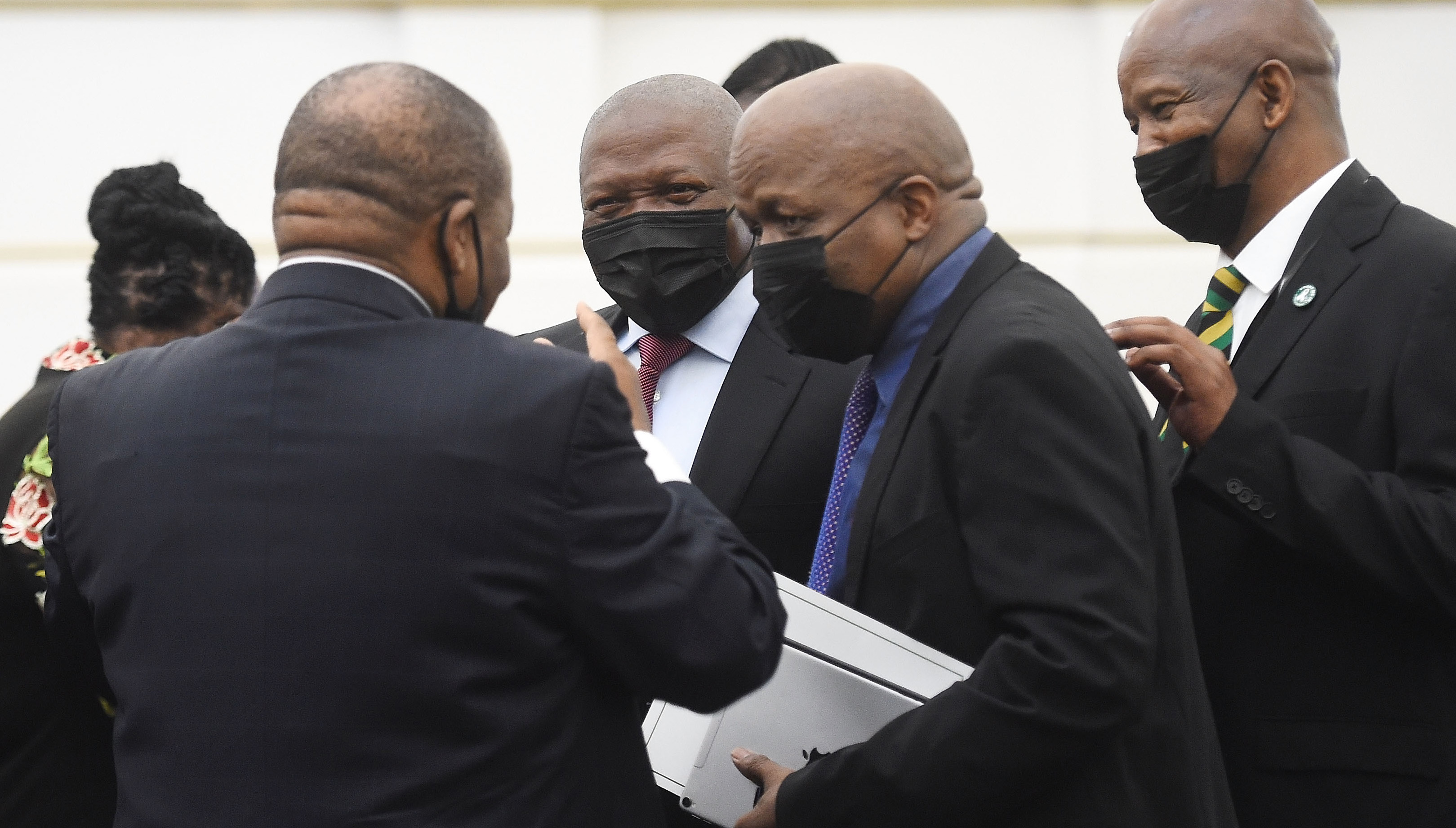
ANC members at the National Assembly on 30 March 2022, where the official leader of the opposition John Steenhuisen tabled a motion of no confidence in the Cabinet. ATM leader Vuyolwethu Zungula had tabled a motion of no confidence in President Cyril Ramaphosa, but that vote was adjourned. (Photo: Xabiso Mkhabela)
But an accommodation was made for a toilet break when several MPs raised pressing calls of nature a few hours into the MP-by-MP roll call of votes in the no-confidence motion in Cabinet.
This did not seem to apply to the ANC MPs who gathered at a nearby outside venue. As every MP not in the House had to vote while visible online, the same chandeliers, wood-panelled and mirrored walls kept on appearing in most, but not all, ANC MPs’ backgrounds.
Daily Maverick is reliably informed that the outside venue was the Cape Sun hotel. It is unclear who paid for the venue hire.
“We will ask who paid for the transport. There is no authority for Parliament buses to transport ANC MPs to where they want to. It’s a conflation of party and state,” said DA MP Samantha Graham-Mare.
But the ANC MPs toed the line, including those traditionally associated with the Radical Economic Transformation (RET) faction, one of whom was Mervyn Dirks, who took a leaked audio clip of Ramaphosa talking about the use of public resources in party campaigns to Parliament’s public spending watchdog, the Standing Committee on Public Accounts (Scopa). He was removed from that committee where his ANC colleagues nixed inquiries beyond the President’s written explanation.
Wednesday’s ANC strategy was to diminish, fielding only two speakers in a move that effectively handed the debate to the opposition.
“[S]uch motions constitute a regular feature in the political repertoire of these and other political parties. The NEC [National Executive Committee] expressed its confidence in President Cyril Ramaphosa and the Cabinet appointed and led by him,” said an ANC statement on Wednesday’s constitutional motion under section 102 of the Constitution.
ANC Deputy Chief Whip Dlakude spoke of the ANC as “defenders of democracy” who were now “facing a relentless onslaught” and a “false narrative” that sought to weaken the ANC and “challenge the legitimacy of a people’s movement”.
Referring to opposition parties as “enemies” and “defeated foes”, Dlakude talked of resistance to transformation and “a concerted onslaught on our leaders” to keep privilege intact.
“They continue to benefit from the crimes against humanity that were perpetrated by their forefathers…”
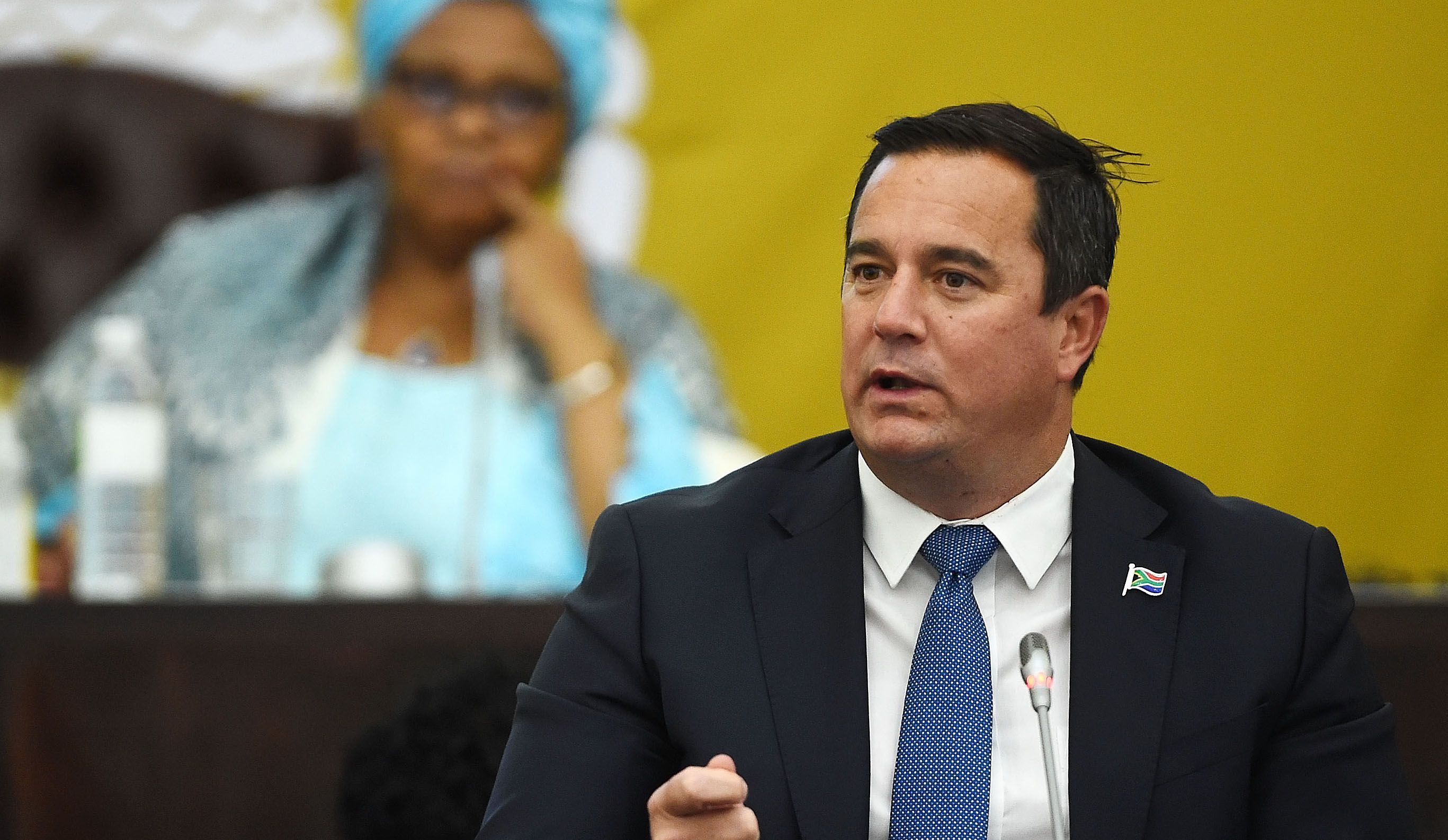
Leader of the DA John Steenhuizen tabled a motion of no confidence in the Cabinet. (Photo: Xabiso Mkhabela)
DA leader John Steenhuisen, who initiated the motion, had earlier called on everyone to put South Africa first.
“[I]n South Africa we have 38 ministries, each with a deputy minister, and sometimes even more than one. And for what? For the sole purpose of rewarding otherwise unemployable cadres with jobs. Not one of these ministers here would last a day in the private sector, where results matter and accountability is still a thing.”
In the end, the motion was defeated with 231 votes against, 131 for and one abstention. That result may well be seen by the governing ANC as job done, even well done.
However, the acerbic sloganeering, raucous conduct across the floor and terse moves around the Ramaphosa no-confidence motion reveal the cost of politicking — and that all’s not well. DM

















 Become an Insider
Become an Insider
Comments - Please login in order to comment.